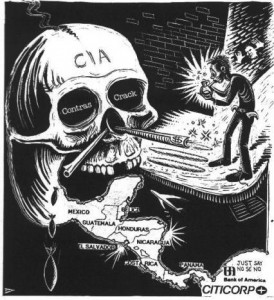Nicaragua in the Shadow of Western Fascism

In her Sorbonne University exam results, French philosopher Simone Weil scored better than Simone de Beauvoir or Jean Paul Sartre. She well understood the varieties of Western fascism and imperialism. So it’s worth paying attention to her remark that Europeans were shocked by Nazi crimes because the Nazis did to them what Europeans did to the people in their colonies. Weil’s remark was hardly news to people in the majority world, but it bears repeating to people in North America and Europe now.
Current US and EU foreign policy embodies fascism in terms of its aspect combining corporate power with State power and policy. The glitzy contemporary version prioritizes monopoly corporate finance and media as means to achieving what the US and EU elites want, avoiding the mass destruction of war with uncertain global outcomes against obdurate, determined antagonists. That is the underlying meaning of contemporary sanctions and psychological warfare against Russia, China, North Korea, Syria and, in Latin America, against Cuba, Venezuela and Nicaragua.
In Latin America and the Caribbean, this reality is self-evident given the nature of US and EU proxies. The US and the EU support repressive organized-crime regimes in Colombia, Brazil and Argentina and those regimes’ counterparts among the political opposition of Bolivia, Cuba, Nicaragua and Venezuela. A corollary of that support is the inability of these subaltern political blocs to tell the truth or honor agreements, exactly like their overseers in North America and Europe.
Examples abound of this reality. Early in 2018 the Venezuelan opposition was on the point of signing an agreement with President Nicolas Maduro’s government but dropped out at the very last minute on orders from US Secretary of State Rex Tillerson. Similarly, the US authorities unilaterally abandoned the process easing tensions with Cuba after years of negotiations and just recently they intensified sanctions by activating previously unused measures under the notorious Helms-Burton Act.
In Colombia, the latest violation of the increasingly debased peace agreement has been the re-arrest of Jesus Santrich on phony narcotics charges after his release under the agreement’s key judicial provision, the Special Peace Jurisdiction. That abuse of the agreement follows over 120 murders of demobilized FARC fighters by Colombia’s army and their narco-terror paramilitary allies. Similar gross bad faith characterizes right wing abuse of judicial practice in Argentina, Brazil and Ecuador and the desperate, unsuccessful maneuvers of the opposition in Bolivia against the presidential candidacy of Evo Morales.
This is the regional context for the political negotiations here in Nicaragua between President Daniel Ortega’s Sandinista government and the US bought-and-paid-for opposition. In contrast to the political opposition in Venezuela, in Nicaragua the talks are not even with elected politicians. The US controlled opposition representatives have deliberately excluded electorally bankrupt right wing political parties from the talks The opposition negotiators are almost without exception individuals from organizations dependent one way or another on US financial support.
The Nicaraguan government has accepted talks with these unrepresentative opposition figures in a process mediated by the Papal Nuncio and a delegate from the Organization of American States. The discussions have been continuing formally since March this year with some progress on issues like the conditional release of prisoners convicted of crimes during last year’s failed coup attempt, the return of opposition supporters who fled the country last year, electoral reforms and reinforcing existing constitutional guarantees. All of these are important concessions by the government.
For their part, the opposition refuse to commit either to renouncing future violence or to a joint call with the government for an end to sanctions damaging the Nicaraguan economy. Nor do they seem open to agreeing a mechanism guaranteeing the implementation of any final agreement that may be reached. In effect, they seem to think the threat of continuing US sanctions and even intervention exonerates them from making any meaningful concessions.
As the talks wear on, the government’s good faith contrasts more and more strongly with the opposition’s bad faith, both to the majority of Nicaragua’s people and to the mediating delegates. As a smokescreen for their perfidy, the opposition periodically stage distractions either via media theatricals or calculated violence. The latest example of this has been a series of attacks by opposition prisoners in the penitentiary where they are detained. But the Nicaraguan authorities preempted the propaganda value of those attacks by inviting the Red Cross to monitor conditions for those prisoners, a measure which has undercut the opposition’s false claims of abuse.
Two things remain absolutely clear at this stage of the failed US and EU attempts to overthrow Nicaragua’s Sandinista government. Firstly, people supporting the Nicaraguan opposition are accomplices to profoundly anti-democratic, anti-humanitarian Western government efforts at regime change against a successful progressive government. Secondly, like their fascist counterparts in Venezuela and Colombia, the Nicaraguan opposition are treacherous quislings committed to serving and obeying foreign corporate interests. They have nothing to offer in response to the impeccable national human development plan of President Ortega’s Sandinista government.
Everything suggests that the opposition delegates are determined to find an excuse either to walk away from the current talks or to renege on any eventual agreement. President Ortega’s government negotiators have already made and implemented important concessions but are sticking to their demand that the opposition call for an end to sanctions. In the end, a final agreement may well be reached, but the US and EU owners of Nicaragua’s opposition will never let them honor it. In fact, it may not be entirely true that Nicaragua’s opposition have no plan for their country: they want to be the rulers of a neoliberal hell like Honduras or Haiti.
*
Note to readers: please click the share buttons below. Forward this article to your email lists. Crosspost on your blog site, internet forums. etc.
This article was originally published on Tortilla con Sal.

